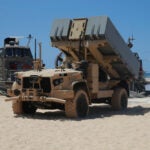
The Pentagon has said a likely short-term continuing resolution to start fiscal year 2020 would impact and delay three major modernization programs, including hypersonic weapon development and the purchase of new Navy and Marine Corps training helicopters. Jonathan Hoffman, the Pentagon spokesman, told reporters on Thursday a short CR would have impacts that are manageable, while noting that Defense Secretary Mark Esper continues to dialogue with lawmakers to avoid a months-long process that would cause significant delays to readiness and…

 By
By 










